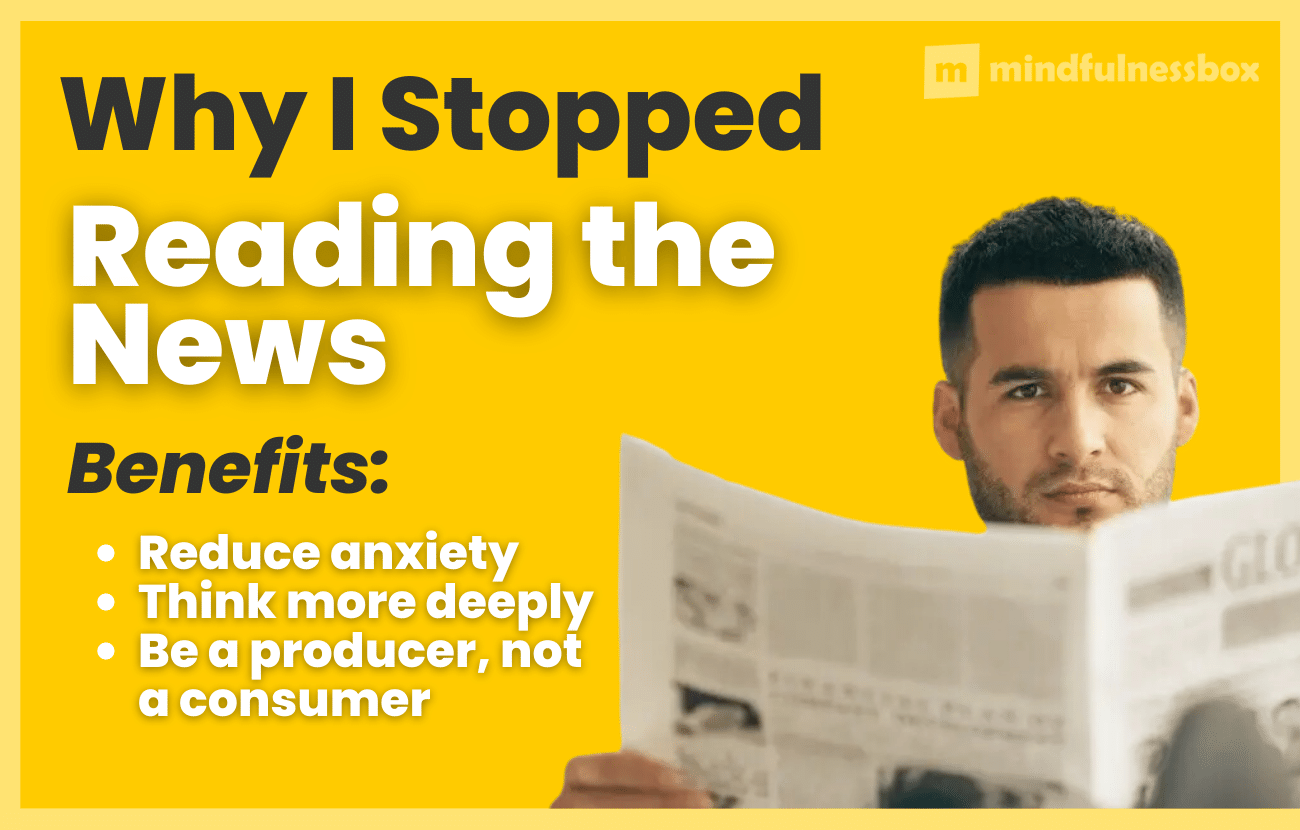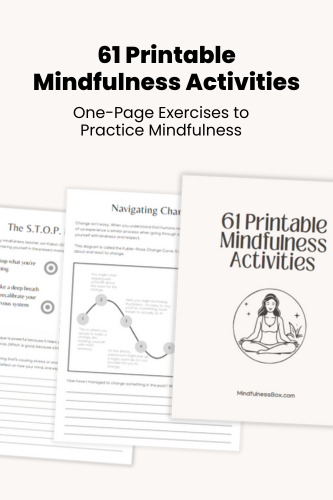There’s no more time-honored morning routine than sitting down at the kitchen table with coffee, eggs, and the newspaper. But I stopped reading the news because it made me anxious. And it made me anxious because it was outside my Circle of Control.
We’ve been trained in this habit. We mirror the behavior shown to us by past generations. My grandparents made it a point to read the full Washington Post every day.
I spent many years reading the news, listening to news podcasts, reading The Economist weekly, and watching comedy shows about the news.
Get dozens of one-page exercises to help practice mindfulness, meditation, gratitude, and self love. Perfect for printable handouts when teaching mindfulness to groups, students, or in the workplace.
To see examples, plus a full list of the 61 exercises included, click below.
But it was making me anxious.
Now I do none of that, and I’m better off for it.
Let me walk you through my thought process, so you can see if you want to experiment with quitting the news, too.
Here’s why I quit the news
In short, I stopped reading the news because it made me anxious. And it made me anxious because it was outside my Circle of Control.
The Circle of Control is an idea formulated by Steven Covey, of ‘7 Habits of Highly Effective People’ fame.
The logic goes like this:
Everyone has things that are important to them: ideas, people, ways of living, philosophies, political principles.
However, our ability to change each outcome is different depending on where an action falls in the circle of control.
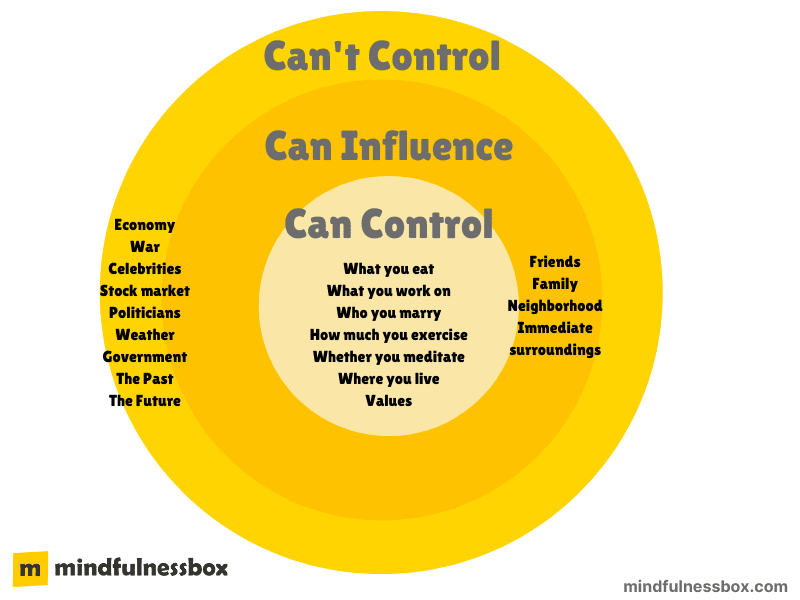
For example, let’s say you feel strongly about electric vehicles.
- Circle of Control: It’s 100% within your Circle of Control to buy an electric vehicle.
- Circle of Influence: You can influence (but not control) your friends and family by explaining to them why electric cars are important. Maybe some of them will decide to get electric cars over time. You can also post on social media to influence your network, or even speak at clean energy rallies to influence others. If you happen to be the CEO of a car company, you can control your own company and influence your peers.
- Circle of Concern: You can’t flip a switch and decide that all people will drive electric cars starting tomorrow. Even if you’re the CEO of a car company, your big-picture vision might not happen within your lifetime. The most you can do is operate within your circle of control and influence.
The news is outside my circle of control
The news falls firmly outside my circle of control.
Conflicts between countries, spats between diplomats, what a celebrity said, who’s been “canceled,” what the government does—I have few to no tools within my circle of control or influence to do anything when I read about these.
It just makes me feel bad and anxious.
If I felt strongly about something, I could express my opinion within my circle of influence. But in most cases, doing anything is beyond their circle of control and influence, too.
My days as a political news junkie
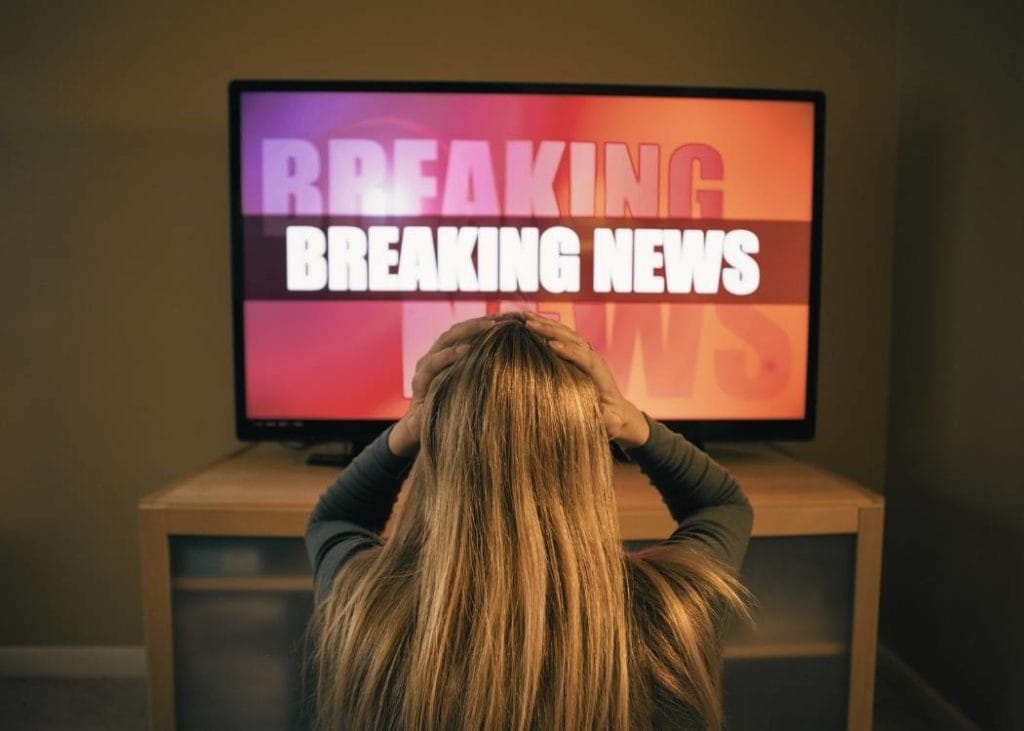
At age 17, I wanted to be a diplomat. I spent countless hours reading news, political blogs, and news satire shows like the Daily Show.
I wrote a college admissions essay arguing that I was doing a public service by staying informed on the news so, in some strange performance of civic duty, I could keep others informed.
I know. Yikes.
I thought it was my civic responsibility to be as informed as possible on what was going on in the world, and on top of that, I enjoyed it.
Reading the news was fun and felt good. Maybe it made me feel superior. I knew the prime minister of Poland and the capital of Madagascar and what was going on with the latest crisis in Asia.
This news addiction continued for probably 15 years, spiking during election seasons into an obsession.
What happened when I quit reading the news
Around the end of 2020, I quit the news.
In my case, it coincided with moving to another country, so it was easier than normal to switch this habit.
My car radio wouldn’t land on the news. I no longer had access to any form of print journalism or magazines. And I wouldn’t even walk by news on TV in my language in airports, stores, or restaurants.
Of course, there was still the Internet.
I got rid of news apps on my phone, and did my best to make them hard to access. Over time, I changed my habits.
No podcasts, no local news, no national news, no international news.
When something particularly news-worthy happens, I know I’ll hear about it from someone else.
Sometimes I slip, but this is my baseline policy.
Quitting the news felt good.
It gave me more time. It reduced my anxiety. It helped me shift from a consumer mentality to a creator mentality.
Is it cynical or selfish to ignore the news?
No. I don’t think so.
Not only because news is designed to absorb your attention, especially in this modern era of clickbait journalism. But also because if there’s anything truly important, it’ll make its way to you.
It’s only been in the last century or two that humans have been faced with this question.
In the past couple hundred years, our Circle of Concern has grown dramatically. Whereas we used to only have to contend with our immediate village or community, our identities are now tied to large nation states.
And sometimes that leads to bewildering outcomes.
I lived in China during a diplomatic spat between China and Japan over a couple of small islands in the East China Sea. I remember vividly seeing Japanese businesses shut down to avoid becoming targets for the rampant vandalism that was happening.
It was surreal to walk by a dealership for Honda, the Japanese car maker, that had draped a Chinese flag over the ‘Honda’ sign. The same happened with my favorite sushi restaurant (below).

Those Chinese vandals were upset over a diplomatic dispute over a couple of large, uninhabitable rocks.
Sounds ridiculous, right? But we do the same thing when we get caught up in scandals and conflicts that are thousands of miles away from us, even if the cause may seem more worthy to us.
That’s not to say that we can’t have an opinion, and it’s not to say that one side in those conflicts isn’t objectively wrong.
But giving a large percentage of our attention to something so far outside of our control is damaging.
The negative cycle of news addiction
When we give our attention over to the news, we often start to feel a sense of helpless dissatisfaction.
And, unlike things that are within our Circle of Control, that sense of dissatisfaction has no productive outlet.
When we feel unhappy and want to feel happier, we have the utmost control over what to do about it. We can change our life circumstances, meditate, or practice gratitude. The dissatisfaction that comes with our unhappiness is a helpful signal, in a way. It’s channeled into the productive mission of finding a way to feel better.
But when we’re upset about the news, anxiety builds up without any productive outlet. There’s nothing we can do but read more news, hoping the situation changes. Since the news is designed to be addictive, it’s an easy trap to fall into.
Benefits of not reading the news
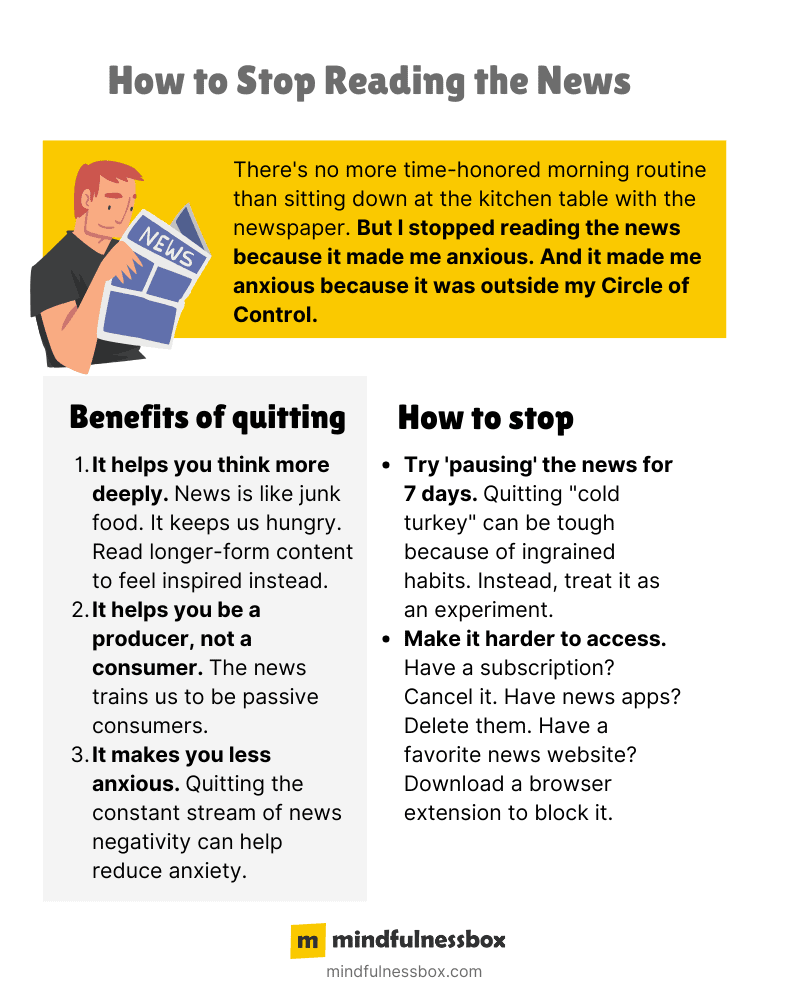
Not reading the news has a number of benefits:
1. It helps you think more deeply
Would you be better served by reading 10 hours of the latest thought pieces on The Guardian, or by spending that same time reading a nonfiction book that goes deep on a single subject?
News is like junk food. It keeps us hungry and doesn’t help us long-term.
Reading long-form nonfiction content, however, can change how we see the world, influencing our perception of all future content we consume.
2. It helps you be a producer, not a consumer
News trains us to be passive. It feels like things are happening to us, and there’s nothing we can do about it.
Breaking away from news has helped me to become a producer, not just a consumer.
Since quitting the news, I finished the first draft of a novel. I’ve also written dozens of articles on this website.
Shifting my focus to things within my Circle of Control has helped me step into the role of a creator.
3. It makes you less anxious
This has been true for me.
While I still worry, and I still have plenty of moments of anxiety, those worries and anxieties are more often about things I have control over: relationships I need to repair, or things I need to do to grow my business.
While feeling anxious is no fun, anxiety that can be channeled towards a productive resolution is better than anxiety about world events that lingers, unable to be resolved.
How to stop reading the news
Curious if life would be better for you without the news?
Don’t try and quit it cold turkey.
Instead, tell yourself it’s an experiment. Try ‘pausing’ the news for 7 days.
Delete news apps from your phone, block news websites in your Internet browser, and (for the love of God) don’t watch the news on TV.
Notice how you feel when you’re not watching the news. Journaling about it might help you notice these feelings better.
Are you feeling less anxious? Do you have more time to work on projects that matter to you, or to engage in self-care?
Mindfulness, happiness, and the news
Mindfulness and happiness aren’t incompatible with the news.
I’m not saying “don’t read the news”: theoretically, you could read the news mindfully. I can imagine monks reading the news with equanimity, and then going about their day.
But being exposed to the news makes mindfulness harder. If reading the news makes you anxious, or if you suspect it may be having a negative impact on your life, experiment with ‘pausing’ the news or work towards removing it from your life.
Today, news is entertainment. The incentives are aligned to keep you reading, clicking, and coming back, regardless of whether that’s what’s best for you.
It’s up to you to choose what’s best for you.
For me, that means no news.

My mindfulness practice kicked off in 2016 with a ten-day silent retreat. Since then, I’ve read dozens of books about mindfulness and completed hundreds of hours of meditation. Thinking about what makes humans happy, calm, and peaceful is endlessly fascinating to me.

